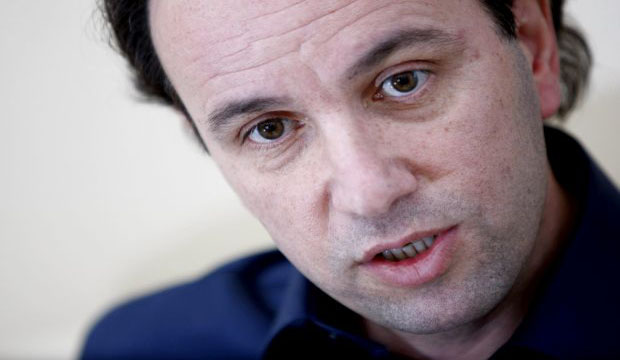
Khaled Khoja was elected as the Syrian National Coalition’s new leader on January 4, 2015. (EPA/Sedat Suna)
Beirut, Asharq Al-Awsat—The Syrian National Coalition is holding meetings today and tomorrow in Istanbul to discuss attendance at talks with the Assad government in Moscow, scheduled for later this month, as Coalition president Khaled Khoja expects to receive a formal invitation to attend the Russia-mediated talks.
The main Western-backed opposition grouping will receive the invitation to attend the talks as an organization, after Moscow had previously sent out individual invitations to opposition figures and was rebuffed, senior Syrian National Coalition member Ahmed Ramadan told Asharq Al-Awsat.
“Khoja will receive his invitation later today and inform the Russian envoy that the Coalition will discuss the issue [of attendance] and the answer will likely be in the form of a written response to the Russian leadership,” Ramadan said.
Russia, a key backer of Syrian President Bashar Al-Assad, issued invitations to as many as thirty opposition figures earlier this month to attend the preliminary talks scheduled to take place between January 26 and 28. Subsequent discussions involving Syrian government representatives are due to be held on January 29, the final day of the talks.
It is hoped the talks will kick-start a new peace process after negotiations stalled following the Geneva II conference held in January last year.
The Syrian National Coalition had earlier said that it was unlikely that any of its members would attend the talks as attendance on an individual basis, and not as a recognized opposition organization, would harm the legitimacy of the Coalition. The Coalition also raised questions about preparations for the talks, as no clear itinerary or agenda has been communicated.
“We believe that Russia is capable of playing a positive and constructive role towards resolving the crisis, but this requires more dialogue with the opposition, and particularly the Syrian National Coalition,” Ramadan added.
He stressed that the Syrian National Coalition would take the decision on attendance as a group, and should it decide not to go to Moscow, then no Coalition members would attend on an individual basis.
Speaking after his election as president of the Syrian National Coalition earlier this month, Khoja said that the only circumstances under which the group would meet representatives of the Assad regime would be “within the framework of a negotiation process that leads to a peaceful transfer of power and the formation of an interim body with full executive powers.”
The Coalition has insisted that any meetings with the Assad regime be based on the Geneva Communique, signed on June 30, 2012, which includes specific provisions regarding a cessation of hostilities as a prelude to forming a coalition government with full executive powers.
Ramadan reiterated that even if the Syrian National Coalition agrees to attend the Moscow talks, it will only do so if the Geneva Communique underpins any dialogue with Assad representatives. He added that the Coalition is currently in the process of drafting a “political framework” document based on the Geneva Communique and UN Security Council Resolution 2118. The resolution demands the destruction or removal of Syria’s chemical weapons stockpile.
